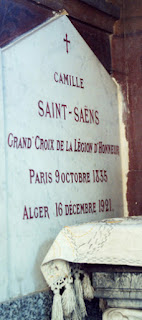1835-1926
Born in Paris into a well off and influential family, there is really no point going into his life in depth on a silent film blog, as he is an extremely well known romantic era composer. I will stick to the early Hollywood credits and provide links below for further reading. Obviously, as such and important, prolific and varied composer, well known for concerto pieces for various instruments, as well a full operas (never mind a myriad of other types musical forms, such as symphonic works), he is going to have a lot of credits in film soundtracks over the years! So it would be the logical assumption that the earliest films to utilize his work would in the late 1920's with the making of the earliest talkies, but in his case, his first credit actually comes in 1913! He is credited under "soundtrack" in one of the earliest epic films and one of the most influential films of the silent era: The Last Days Of Pompeii--a real "game changer" after it's release. It is widely credited as being the first real epic--88 minutes in time length, a virtual eternity for 1913! For example, at the time director D. W. Griffith was still turning out shorts! The credit Saint-Saëns gets here, is for some of his operatic work as dances. He has a few other credits in the silent era, before getting a music soundtrack credit finally in a talky in 1929. As to other credits, he is featured in the 1915 documentary Those Of Our Land (an English translation of a French title) about famous Frenchmen of the time. He also composed some works directly for films in the silent era, starting 1908 (obviously for a live organist to play). The first credit he gets for actually being included in a real soundtrack came in 1929 full talky The Country Gentlemen, sound provided by Vitaphone. Here's one interesting recent credit...for all the Countdown To Halloween folks!
 |
| Sketch of him as boy at his favorite instrument The organ. |
It is also notable that he was one of the only major composers of his time to be very interested in recorded music; and in 1904 he made an operatic record (yes the kind that went on a turn table) with the The Gramophone Company (which was founded in 1897). He literally worked right up until the time of his death in 1921, having given a recital in Paris a month before his passing. A little less than one month later he traveled to Algiers, as Algeria the country was still then a French colony called "Alger," with intention over-winter there. Not there long, he died at the age of 86 of a heart attack. His remains were transported back to Paris where he was given a state funeral and then interred in Paris' very famous Montparnasse Cemetery.
 |
| [Source: Find A Grave] |
 |
| Family crypt [Source: Find A Grave] |
For More:
Also, check on YouTube

No comments:
Post a Comment